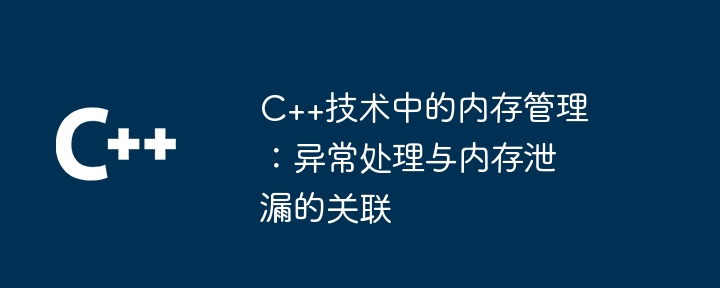
In C, exception handling is closely related to memory leaks, because memory allocated in the exception handler may not be released. Therefore, use smart pointers or RAII in exception handlers to manage memory and use finally blocks to ensure memory is released to prevent memory leaks.

Memory management in C technology: the relationship between exception handling and memory leaks
In C, memory management is important for the program Robustness and performance are critical. Among them, there is a close connection between exception handling and memory leaks.
Exception handling
Exceptions are abnormal situations that occur when the program is running, such as array out-of-bounds, memory access conflicts, etc. C provides exception handling mechanisms to deal with these situations. When an exception occurs, the exception handler will be executed to handle the exception.
Memory leak
A memory leak means that the program allocates memory but no longer uses it, resulting in the memory not being released and used again. Memory leaks can cause memory resource exhaustion and program crashes.
The correlation between exception handling and memory leaks
The reason why there is a correlation between exception handling and memory leaks is:
new operator to allocate memory to record exception information or perform other operations. If this memory is not released properly, a memory leak occurs. Practical Example
Consider the following C code snippet:
int* myArray = new int[10];
try {
// 使用 myArray
...
}
catch (std::exception& e) {
// 分配更多内存来保存异常信息
char* errorMessage = new char[100];
strcpy(errorMessage, e.what());
// 内存泄漏:未释放 errorMessage
}In this example, ## is assigned in the exception handler #errorMessage to save exception information. If an exception is thrown, errorMessage will not be released, causing a memory leak.
Preventing memory leaks
In order to prevent memory leaks caused by exception handling, you need to ensure that all memory allocated in the exception handler is released. You can use the following techniques:) or range scopes (RAII) to manage memory.
blocks in exception handlers to ensure that memory is released under any circumstances.
The above is the detailed content of Memory management in C++ technology: the relationship between exception handling and memory leaks. For more information, please follow other related articles on the PHP Chinese website!
 What are the differences between c++ and c language
What are the differences between c++ and c language
 Recommended learning order for c++ and python
Recommended learning order for c++ and python
 Cost-effectiveness analysis of learning python and c++
Cost-effectiveness analysis of learning python and c++
 Is c language the same as c++?
Is c language the same as c++?
 Which is better to learn first, c language or c++?
Which is better to learn first, c language or c++?
 The difference and connection between c language and c++
The difference and connection between c language and c++
 C++ software Chinese change tutorial
C++ software Chinese change tutorial
 Cost-effectiveness analysis of learning python, java and c++
Cost-effectiveness analysis of learning python, java and c++




